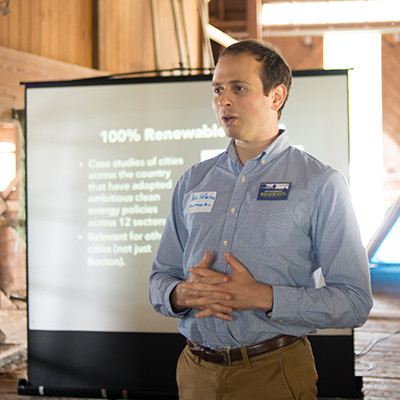
Ben Hellerstein
Former State Director, Environment Massachusetts
The Healey administration announced $50 million in funding for energy efficiency and electrification retrofits in low- and moderate-income housing last week, responding to advocacy by Environment Massachusetts and our partners.
Updated
Former State Director, Environment Massachusetts
Last week, Gov. Maura Healey’s administration announced the availability of $50 million in funding to retrofit low- and moderate-income housing in Massachusetts. These retrofits will improve energy efficiency and replace oil and gas heating systems with clean, electric alternatives like heat pumps, reducing harmful pollution and saving residents and property owners money on their utility bills.
In December 2021, the Legislature appropriated $6.5 million to retrofit low- and moderate-income homes in Massachusetts’ Gateway Cities — a measure inspired by the GREEN Act, a bill filed by state Reps. Natalie Higgins and Michael Kushmerek and state Sen. Brendan Crighton. The recent announcement from the Healey administration builds on this program, adding funds from other sources to increase the number of housing units that can be retrofitted.
For years, Environment Massachusetts has worked closely with our partners at Massachusetts Climate Action Network (MCAN) and Clean Water Action to advocate for the GREEN Act and to push for the timely rollout of these funds.
The energy we use to heat and cool our buildings and to generate electricity accounts for the majority of Massachusetts’ greenhouse gas emissions. Burning oil and gas to heat our homes also releases harmful pollution into our neighborhoods that is linked to asthma, heart attack, stroke, premature birth, and many other health problems.
To protect public health and prevent the worst impacts of climate change, we must make our buildings more energy-efficient and switch our heating systems to clean, electric technologies like heat pumps.
While utilities and state agencies offer energy efficiency programs, these programs don’t always serve low-income families adequately. Several obstacles can stand in the way of efficiency improvements, including language barriers, a lack of access to credit, and the need to make structural repairs before homes can be retrofitted. Additionally, many low-income families are renters and must rely on landlords to make any improvements to their homes.
These challenges are especially acute in Massachusetts’ Gateway Cities — 26 mid-sized cities, like Brockton, Chelsea, and Holyoke, with a rich history and modern-day economic challenges. Many houses and apartments in Gateway Cities were built more than a century ago. These buildings often use energy inefficiently, due to a lack of insulation, old appliances, and outdated lighting fixtures.
Figuring out the most effective approach to retrofit homes in Massachusetts’ Gateway Cities will reduce greenhouse gases and other harmful pollutants, while developing models that can be replicated in communities of all shapes and sizes.
Gateway Cities have an important role to play in the statewide transition to 100% renewable energy. Through innovative action at the local level, these communities can lead the Commonwealth toward a greener future.
In 2019, we worked with MCAN and Rep. Higgins to file a bill to study the best approaches for retrofitting homes in the Gateway Cities.
At the start of the next legislative session, in 2021, we rewrote the bill and gave it a new name: the GREEN (or “Gateway Cities Renewable, Efficient, and Electrified Neighborhoods”) Act. The GREEN Act, filed by Rep. Higgins, Rep. Kushmerek, and Sen. Crighton, proposed a two-year pilot program to retrofit a few hundred housing units to be energy-efficient, fossil-fuel-free, and (where possible) powered by rooftop solar panels. Data collected during the pilot phase would help inform the design of the second stage of the program, which would retrofit many more housing units.
Working with MCAN, Clean Water Action, and the legislative sponsors, we presented this bill at a meeting of Gateway Cities legislators and submitted testimony to the Joint Committee on Telecommunications, Utilities and Energy. We also shared research on the benefits of building electrification and worked to generate coverage in the media.
We won two important victories in the 2021–22 legislative session:
First, in December 2021 we secured $6.5 million in funding to launch a retrofit program closely modeled on the pilot phase of the GREEN Act.
And second, a major climate bill signed into law in August 2022 included a provision allowing for similar low-income retrofit initiatives to be funded as part of utilities’ energy efficiency programs.
With the pilot program soon to be up-and-running, Rep. Higgins, Rep. Kushmerek, and Sen. Crighton have refiled the GREEN Act to provide ongoing funding for energy retrofits in the Gateway Cities.
Transitioning our homes from fossil fuels to clean, efficient technologies is no easy task, but it’s a necessary one. The Healey administration’s recent announcement is a sign that we’re moving in the right direction. At Environment Massachusetts, we’ll keep working to make sure that families from all walks of life have the opportunity to retrofit their homes.
Former State Director, Environment Massachusetts
